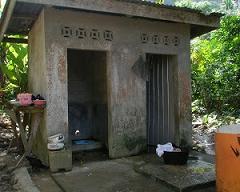
Download The World Health Organisation says more than 1 billion people in the world still defecate outside in the open.
60 percent out of them live in Asia.
Indonesia’s West Nusa Tenggara Province has launched a program to make the area open defecation free.
As Rachmawati reports, a subdistrict of the capital of Mataram is using unique methods to support the program.
60-year-old Darsiah is so ashamed.
“I was just by the river and then I was caught... I was defecating. An officer scolded me and I was made to pay a fine of half a US dollar.”
Darsiah is a villager in Karang Bagu in Mataram, the capital of Indonesia’s West Nusa Tenggara Province.
Village head Asmuni says that people have been warned.
“I’ve informed our people not to defecate in the river again. We have a rule here, to fine anyone caught defecating in the river. If you don’t have a household toilet, please let us know. We will try our best to build one for you.”
The rule was introduced last year and since then more than 10 people have been fined.
Indonesia aims at fully eradicating open defecation by 2014.
And subdistricts across Mataram are using unique methods to support the policy.
Akhsanul Khalik is one of the subdistrict heads.
“We have different local rules here. Like in Sayang-sayang subdistrict, people who are caught defecating will be scolded, and then we’ll give them a written warning. And if they continue doing it, we will broadcast their name with a loud speaker from the mosque. We will state their name, where they defecated, and the fact that we have given them a warning. So people will know about it. We hope that this will work as a shock tactic for the community.”
Khairunnisa who lives on the river bank supports this.
“If you look at the river from here, you can see the posters on the river side. That’s where people defecate, behind the posters. So every time someone wants to defecate, they go there.”
But not everybody’s happy with the idea, including Zainal Arifin, another subdistrict head.
“I don’t think it’s an effective method because it will only humiliate people.”
The local government is planning to delay issuing administrative documents to those who have been caught defecating in the open air.
But local NGO director Ahmad Junaidi says it violates people’s rights.
“You can sanction people but you can’t deny someone’s rights to administrative services, for example, the issuing of their ID cards. It’s not related to their personal behavior .... it’s also people’s basic right to have access to public services. If there are issues of land scarcity, the government should try to make use of public spaces.”
Since 2010, the Mataram government has banned open defecation.
Dozens of subdistricts claimed to have eradicated the practice.
But with more than one thousand people living in the village, village head Asmuni says it’s not easy to find empty space to build toilets.
“We want every family to have a toilet. But it’s hard to find any space in peoples houses because they don’t have that much land. The houses are just big enough for them to lay down in.”
And until then, Sairah will have to continue defecating in the river...
“I’m used to defecating here in the river. I usually do it at night so people won’t find out. Everyone else is doing it as well.”













